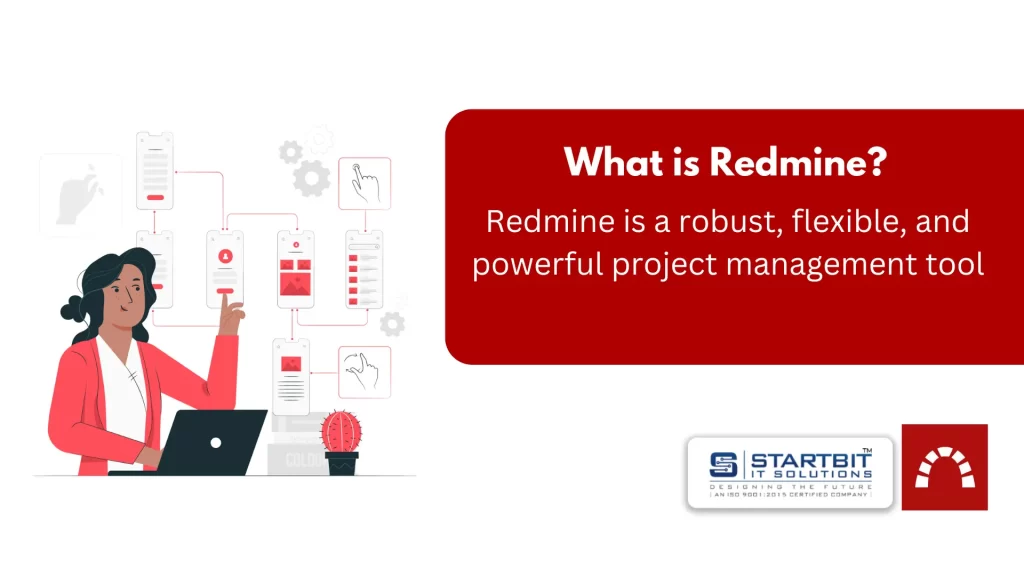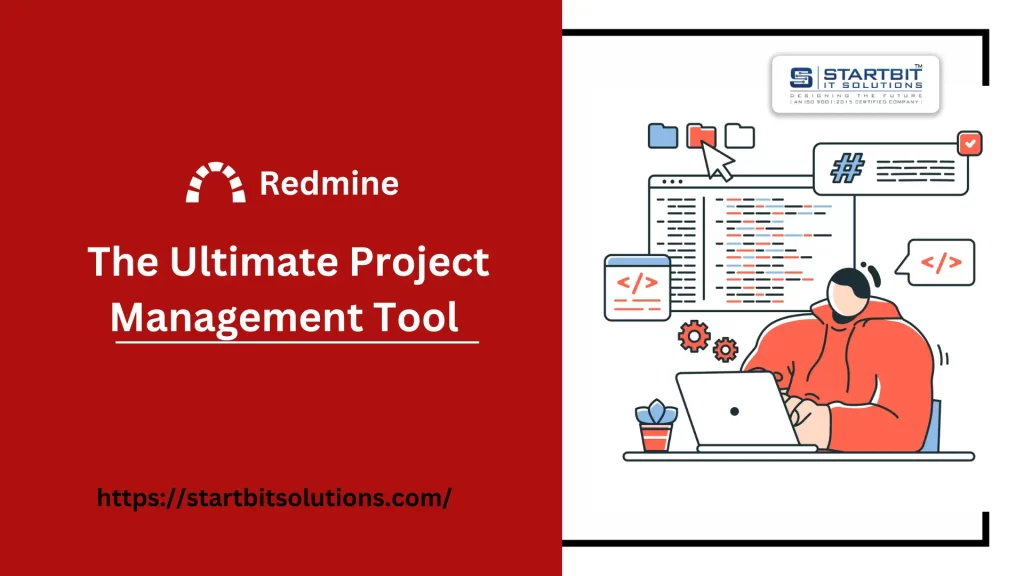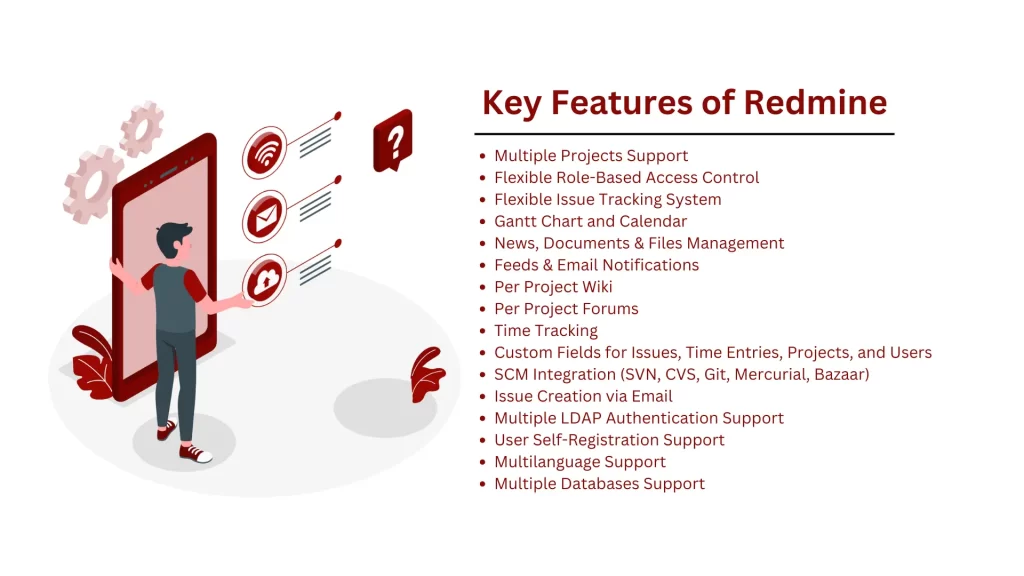
What is Redmine:
Redmine is a robust, flexible, and powerful project management tool that has gained popularity among businesses and project managers worldwide. This open-source platform is designed to handle multiple projects and offers a wide range of features that make it an ideal choice for managing complex workflows. With its versatile capabilities, Redmine stands out as a comprehensive solution for project management, issue tracking, and team collaboration.
.
Key Features of Redmine:
.
Multiple Projects Support:
Redmine’s multiple projects support feature allows organizations to manage numerous projects within a single instance. Each project can be configured independently, providing flexibility in setting up unique workflows, permissions, and settings for different projects. This capability ensures that all projects are organized and managed efficiently without requiring separate installations or instances.
.
Flexible Role-Based Access Control:
With flexible role-based access control, Redmine enables administrators to define specific roles and assign permissions accordingly. This feature ensures that users have access only to the information and functionalities they need for their tasks. Roles can be customized to match the organizational structure, enhancing both security and operational efficiency.
.
Flexible Issue Tracking System:
Redmine’s flexible issue-tracking system allows teams to create, categorize, prioritize, and assign issues effectively. Custom workflows and statuses can be configured to match the team’s processes. This system ensures that issues are tracked from creation to resolution, facilitating efficient problem management and resolution.
.

Gantt Chart and Calendar:
The Gantt chart and calendar features in Redmine provide visual tools for project planning and tracking. Gantt charts offer a graphical representation of project timelines, showing task dependencies and progress. Calendars help teams to schedule tasks and milestones, ensuring that deadlines are met and resources are allocated efficiently.
.
News, Documents & Files Management:
Redmine supports news, documents, and file management to keep all project-related information centralized. Teams can share updates through project news, store important documents, and manage files within Redmine. This centralized approach ensures that all team members have access to the latest information and resources, enhancing communication and collaboration.
.
Feeds & Email Notifications:
To keep team members informed about project updates, Redmine offers feeds and email notifications. Users can subscribe to RSS feeds for real-time updates on project activities. Automated email notifications to alert team members about changes, ensuring timely awareness and response to important developments.
.
Per Project Wiki:
Redmine’s per-project wiki feature allows teams to create and maintain project-specific documentation. Each project can have its own wiki, serving as a centralized repository for guidelines, knowledge, and important information. This feature promotes knowledge sharing and helps team members quickly access the information they need.
.
Per Project Forums:
The per-project forums in Redmine provide a platform for team discussions and collaboration. Each project can have its own forum, keeping conversations organized and relevant. This feature supports effective communication, brainstorming, and problem-solving within the team.
.
Time Tracking:
Redmine includes a robust time-tracking feature that allows team members to log hours spent on tasks and projects. This data helps in monitoring productivity, estimating project costs, and ensuring efficient resource allocation. Time-tracking reports provide valuable insights for better project planning and management.
.
Custom Fields for Issues, Time-Entries, Projects, and Users:
Customization is a key strength of Redmine, and the ability to create custom fields for issues, time entries, projects, and users enhances its flexibility. Teams can add custom fields to capture specific information relevant to their workflows, ensuring that Redmine can adapt to diverse project management needs.
.
SCM Integration (SVN, CVS, Git, Mercurial, and Bazaar):
Redmine integrates seamlessly with various source code management (SCM) systems such as SVN, CVS, Git, Mercurial, and Bazaar. This integration allows teams to link commits to issues, view repository changes within Redmine, and streamline the development process, ensuring better coordination between project management and version control.
.
Issue Creation via Email:
To enhance accessibility, Redmine supports issue creation via email. Team members can create new issues by sending an email to a designated address. This feature is particularly useful for remote teams or members who need to report issues while on the go, ensuring that all issues are captured and tracked efficiently.
.
Multiple LDAP Authentication Support:
Redmine’s support for multiple LDAP authentication systems simplifies user management by allowing users to log in with their existing directory service credentials. This feature ensures secure and efficient access to Redmine, reducing the need for separate account management and enhancing integration with existing IT infrastructure.
.
User Self-Registration Support:
Redmine provides user self-registration support, allowing new users to create their accounts independently. Administrators can configure self-registration settings to control access and ensure that only authorized users can join. This feature streamlines the onboarding process and reduces the administrative burden of managing user accounts.
.
Multilanguage Support:
Designed for a global audience, Redmine offers multilanguage support. The platform is available in multiple languages, allowing teams from different regions to use Redmine in their preferred language. This feature enhances usability and accessibility, making Redmine a versatile tool for international teams.
.
Multiple Databases Support:
Redmine’s flexibility extends to database management with multiple databases support. It is compatible with MySQL, PostgreSQL, SQLite, and Microsoft SQL Server. This compatibility allows organizations to choose the database system that best fits their existing infrastructure and technical preferences.

.
Advantages of Using Redmine:
- Efficient Project Management: Redmine excels in project management. It provides a comprehensive suite of tools for tracking tasks and milestones. Teams can easily manage multiple projects simultaneously. This ensures a seamless workflow and enhances productivity.
- Customizable Workflows: One of Redmine’s standout features is its customizable workflows. Users can tailor the system to fit their specific needs. This flexibility allows for a more personalized project management experience. It adapts to various industries and project types.
- Enhanced Collaboration: Redmine fosters collaboration among team members. It offers forums, wikis, and shared documents. These tools facilitate communication and knowledge sharing. As a result, teams can work together more effectively.
- Time Tracking and Reporting: Accurate time tracking is essential for any project. Redmine’s time tracking feature ensures that all work hours are accounted for. Additionally, its reporting capabilities provide valuable insights. These insights help in making informed decisions and improving project efficiency.
- Integrated Issue Tracking: Redmine’s integrated issue tracking system is a major advantage. It allows teams to track bugs, feature requests, and other issues. This system ensures that all issues are addressed promptly. Consequently, it improves the overall quality of the project.
- Versatile Plugin Support: Redmine supports a wide range of plugins. These plugins extend its functionality and offer additional features. Users can customize their Redmine setup to meet their unique requirements. This versatility makes Redmine a powerful tool for project management.
- User-Friendly Interface: Redmine boasts a user-friendly interface. It is intuitive and easy to navigate, even for beginners. This ease of use reduces the learning curve and helps teams get up and running quickly. An efficient interface enhances overall user satisfaction.
- Secure and Reliable: Security is a top priority for Redmine. It provides robust security features to protect project data. Regular updates ensure that the system remains secure and reliable. Teams can trust Redmine to safeguard their sensitive information.
- Open-Source and Free: Redmine is an open-source project management tool. It is available for free, making it accessible to everyone. This open-source nature encourages community contributions and continuous improvement. Users benefit from an ever-evolving platform.
.
Conclusion:
Redmine stands out as an ultimate project management tool, offering robust features that streamline project planning, tracking, and collaboration. With the expertise and support of Startbit Solutions, organizations can harness Redmine’s full potential to enhance efficiency, ensure transparency, and achieve project success. Startbit Solutions’ customization, implementation, and support services empower teams to tailor Redmine to their specific needs, making it an indispensable tool for managing projects of any scale and complexity.


